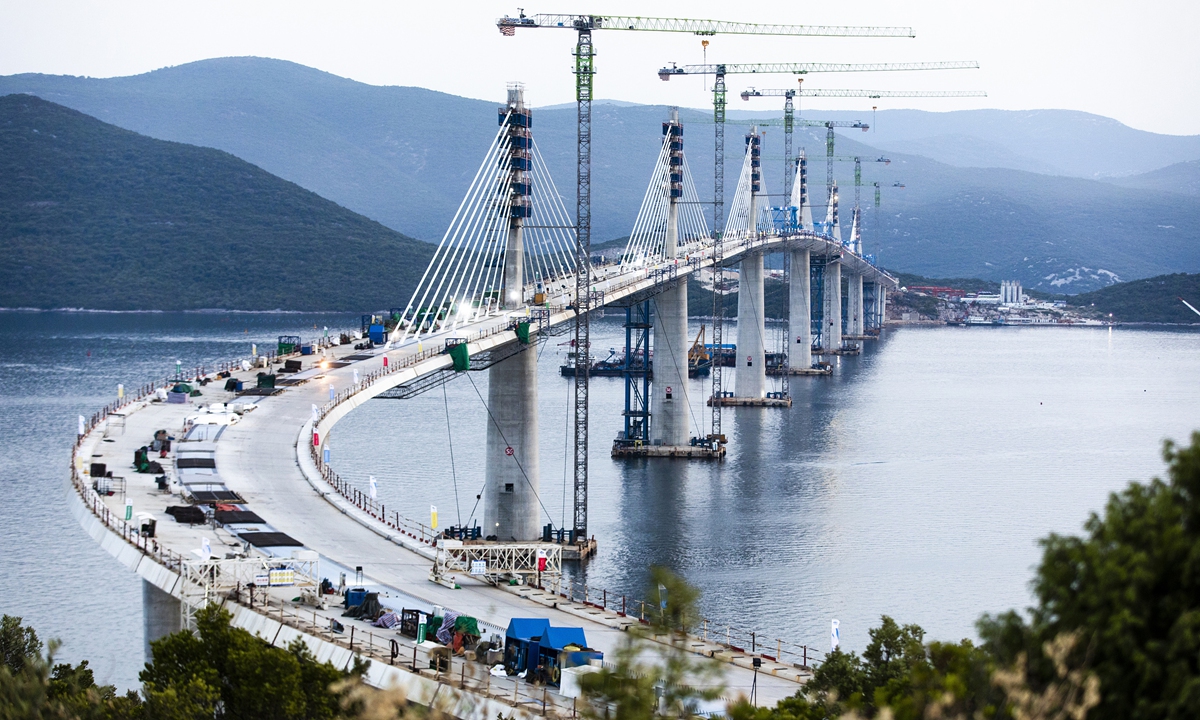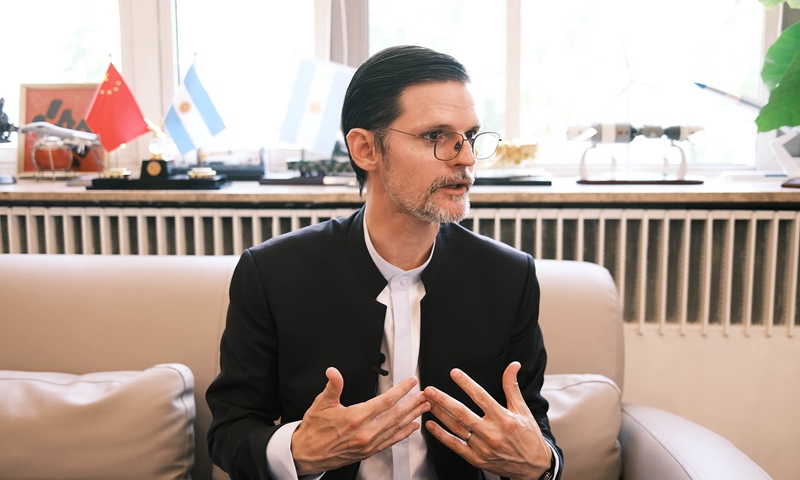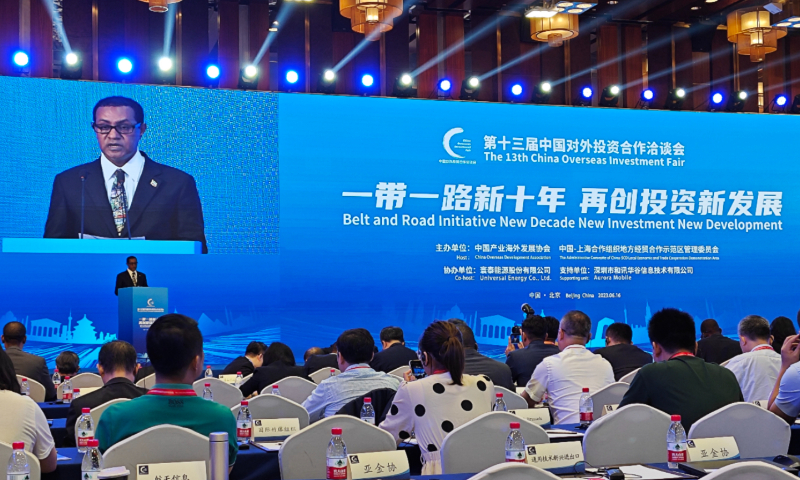
A view of the construction of Peljesac Bridge in Komarna, Croatia on July 28, 2021.Photo: VCG
Editor's Note:This year marks the 10th anniversary of the Belt and Road Initiative (BRI) proposed by Chinese President Xi Jinping. Through the lens of foreign pundits, we take a look at 10 years of the BRI - how it achieves win-win cooperation between China and countries along the Belt and Road and how it increases people's sense of fulfillment in these countries.
"China became a powerful voice on behalf of the developing countries, not just by word but crucially by deed," wrote Martin Jacques, a visiting professor at the Institute of Modern International Relations at Tsinghua University and a senior fellow at the China Institute, Fudan University.
This is the first article of the series.
When the Belt and Road Initiative (BRI) was first proposed 10 years ago, as well as much anticipation, there was considerable puzzlement. "What is it?" was a widely asked question. And quite reasonably so. Because it was like nothing we had seen before. This was not a plan with fixed dates. There was nothing concrete. There were no boundaries. There was no end date. In every sense it was open-ended. It was an idea, a concept. It was a totally new and original way of thinking about a project. Furthermore, it was on the hugest of scales, encompassing the great majority of the world's population.
We have never seen anything like this before. The nearest was America's Marshall Aid plan between 1947 and 1952, but that was puny in comparison. Its inspiration, if anywhere, lay in China's own past and such extraordinary feats as the Great Wall and the Grand Canal.
The point of departure for the idea of BRI was a reflection on China's own economic transformation. What lessons might be drawn from this for the developing world? What could the developing countries learn from it? At the heart of China's transformation was state-led, large-scale investment in infrastructure. If it worked for China, then why not for others? Most of the Eurasian land mass, together with Africa and Latin America, suffered from a disabling shortage of infrastructure. BRI would seek to change that. China would be the hub of the project. It would consist of a multitude of bilateral agreements between China and the developing countries, with China providing the funding, typically in the form of loans. The response has been enormous with 151 countries now participating in BRI.
If many scratched their heads in puzzlement about BRI when it was first announced, this has long ceased to be the case. Everyone now knows in varying degrees what it is about. In 10 short years, it has become part of the global geo-economic firmament, no less than the IMF and the World Bank. Let's remind ourselves where China was in 2013 when it was first launched. The country was in the process during which the overriding priority had been China's own economic development; it was quiescent on the global stage, seeking to keep a low profile, a rule-taker not a rule-maker, famous for its extraordinary economic growth rate but not for its international initiatives, which it sought to avoid. Little did we know at the time, but the launch of BRI was to signal a huge shift in China's relationship with the world. It marked the moment of China's coming out. And it was to prove remarkably successful. It is not an exaggeration to argue that over the decade of its existence it has changed the world.
In what ways?
First, BRI promoted the question of development to a position of fundamental centrality on the global stage. The West had always paid little more than lip-service to the developing world, which it looked down upon and treated in an exploitative, paternalistic, and authoritarian manner. BRI offered a new kind of solution for the developing countries. And in the process the developing world came to occupy an increasingly important position on the global stage.
Second, BRI forged a new kind of relationship between China and the developing world. China came to be seen as the champion of the developing countries. It became a powerful voice on behalf of the developing countries, not just by word but crucially by deed.
Third, BRI paved the way for a new kind of global alignment and, as a result, a new kind of global politics. The relationship between China and the developing world is not based on a shared view of politics or ideology, nor military alliances, but on the most important issue facing the great majority of the world's population, that of development. This is entirely different from the West's approach. BRI has been the agency and stage for this shift, which we see expressed in many different ways. One example is the very independent attitude of the Global South towards the Ukraine war. BRI has heralded the rise of geo-economics as a new force in geo-politics.
Fourth, BRI has introduced, for the first time, key tenets of Chinese philosophy to the wider world. For over two centuries the language and concepts of international relations and politics have been exclusively Western. That era is now well and truly over. With BRI has come new ways of conceptualising: the ability to think in truly global terms because development is quintessentially a global issue; a very different idea of time, with timescales hugely longer - far from being limited to a few years, or at most a decade as in the Western mind, in the case of BRI we must think in terms of half a century, or even without any time limits at all, such is the challenge of development. Then, of course, we have the idea of win-win relationships rather than zero-sum thinking. Then there is China's concept of a human community with a shared future, with BRI its living embodiment, that encourages us to think beyond the narrow constraints of the nation-state. BRI is like a crash course in Chinese philosophy.
Fifth, BRI is an entirely new kind of international institution. The international system has been dominated by US-style institutions, like the IMF and the World Bank, whose distinctive characteristic is that they represent and speak on behalf of a small minority of humanity. BRI, in contrast, is a new kind of international institution that seeks to represent 85 percent of the world who live in the developing world. In other words, it offers a glimpse of a very different kind of international system in which the interests of the majority rather than the minority predominate.
BRI comprises the great majority of the world's nations. They are drawn from across Eurasia - including Central Asia, Southeast Asia, South Asia, the Middle East, and parts of Europe - together with Africa and Latin America. China's non-financial outbound direct investment to countries along the Belt and Road since 2013 had exceeded $140 billion by the end of June, 2022. It is important to see BRI as a dynamic institution, one that is constantly moving and changing as the world itself changes. In the initial phase, the main emphasis was on very large-scale infrastructural projects, but alongside these, SMEs, environmental and climatic needs, digital technology, and green projects have been acquiring growing significance. An obvious example of how BRI can ebb and flow depending on the wider environment was the pandemic which inevitably led to a period of significantly reduced Chinese investment. Or take a very different example. The Ukraine war has necessitated a new emphasis on maritime routes. For the time being some of the rail routes have been affected - most obviously in Ukraine.
What then, finally, of the Western response. The US initially dismissed BRI as irrelevant. But, as a growing number of countries signed up for BRI, it became impossible to ignore, so the US then shifted its emphasis and sought to undermine it, accusing China of debt diplomacy. The contrary, in fact, was the case. China has gone to great lengths to help countries avoid getting into deep debt. What could China gain from seeing countries becoming debt-ridden: it would defeat the whole object of BRI. With the overwhelming success of BRI, the West has finally come to recognise that it needs to offer an alternative to BRI. But there is little or no sign that the West, be it the US or EU, or the two combined, has the commitment, the resources, or the political conviction to come up with a viable alternative. It would require a huge shift in the West's attitude towards the developing world, one which is patently not forthcoming. After 10 years, the West has nothing to offer. BRI is the only show in town. And what an extraordinary show it has been.



